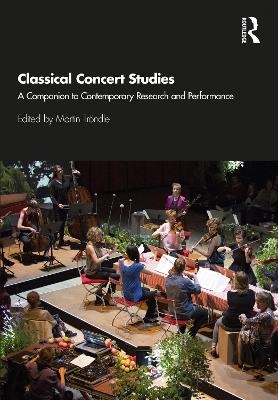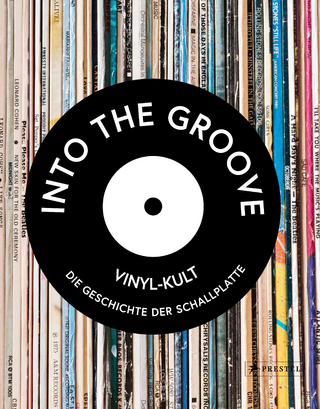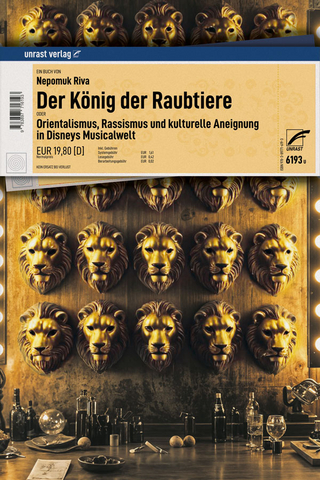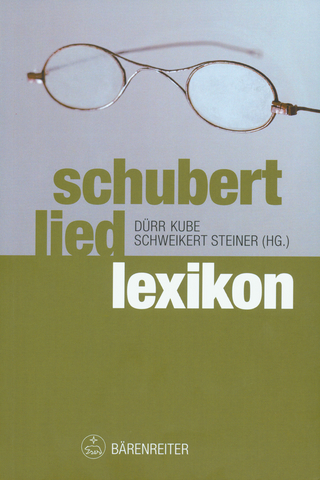
Classical Concert Studies
Routledge (Verlag)
978-0-367-85595-6 (ISBN)
Classical Concert Studies: A Companion to Contemporary Research and Performance is a landmark publication that maps out a new interdisciplinary field of Concert Studies, offering fresh ways of understanding the classical music concert in the twenty-first century. It brings together essays, research articles, and case studies from scholars and music professionals including musicians, music managers, and concert designers. Gathering both historical and contemporary cases, the contributors draw on approaches from sociology, ethnology, musicology, cultural studies, and other disciplines to create a rich portrait of the classical concert’s past, present, and future.
Based on two earlier volumes published in German under the title Das Konzert (The Concert), and with a selection of new chapters written for the English edition, this companion enables students, researchers, and practitioners in the classical and contemporary music fields to understand this emerging field of research, go beyond traditional disciplinary boundaries and methodologies, and spark a renaissance for the classical concert.
Martin Tröndle is the WÜRTH Chair of Cultural Production at Zeppelin University, Germany, and a principal investigator of ECR—Experimental Concert Research, a project that investigates aesthetic experience in the classical concert. He is also Co-Editor-in-Chief of the peer-reviewed Journal of Cultural Management and Cultural Policy.
List of figures
List of tables
Acknowledgements
List of contributors
Concert Studies
I. The Concert as an Event
1. A Concert Theory
2. Music as Text, Music as Performance
3. 4’33"
The Concert as a Performative Moment
4. The Discovery of Listening in the Concert
5. Between Formalization and Exaggeration: An Ethnomusicological Perspective
6. Concert Formats: Liturgy—Ritual—Power?
II. Programs, Formats, and Media
7. From Program Leaflets to Listening Apps: A Brief History of Guided Listening
8. Space, Light, Proximity: Aspects of Historical Performance Practice
9. Preludes, Fantasias, and Collages: Improvisation, a Forgotten Art in the Classical Concert
10. Concert Design: Form Follows Function
11. Musical Curator and Concert Director
12. The Yellow Lounge Reinvents the Concert Forum
13. Strategies for the Production of Presence
III. Space—Sound—Instruments
14. Noise and Sound: The Historicity and Sociability of the Senses
15. From Sound to Noise: The History of Hearing in the Nineteenth and Early Twentieth Centuries
16. The Soundscape of Vienna: Pictorial Essay
17. The Cultural Dimensions of Atmospheres: Sociological Observations of the resonanzraum in Hamburg
18. A Sociological Reflection on the Concert Venue
19. Cinema for the Ears: Technical Developments in Acoustics and Loudspeaker Systems
20. Digital Encore: Virtualization, Live Coding, and New Interfaces
IV. The Audience and the Musicians
21. Between Audience Decline and Audience Development:
Perspectives on the Professional Musician, Music Education, and Cultural Policy
22. Musical, Social, and Moral Dilemmas: Investigating Audience Motivations to Attend Concerts
23. Studying Music . . . And Then What?
24. "Playing Concerts Is Not Enough": On the Identity of the Deutsche Kammerphilharmonie Bremen
25. Women in Music Culture: A History of (Non-)Participation?
26. The Konzerthaus Berlin: A Concert Hall in Transition
27. Audience Development and Engagement
V. Economy and Policy
28. The Influence of Economic Variables in the Concert Industry
29. Roll Over Beethoven . . .: Notes on Concerts under Conditions of the Culture Industry
30. The Dematerialization of Music: How Streaming Technology Impacts Music Production and Consumption
31. The "New Classic"
32. Actors in the Classical Music Business: A Media Discourse Analysis
VI. Concert Research
33. A Manifesto of Concert Culture
34. Concerto21: A Didactic Introduction for Concert Development
35. The Researching Orchestra: Innovative Collaborations between Symphonic Orchestras and Knowledge Institutions
36. The Classical Concert as an Object of Empirical Aesthetics
Index
| Erscheinungsdatum | 03.09.2020 |
|---|---|
| Übersetzer | Erik Dorset |
| Zusatzinfo | 4 Tables, black and white; 12 Line drawings, black and white; 50 Halftones, black and white; 62 Illustrations, black and white |
| Verlagsort | London |
| Sprache | englisch |
| Maße | 178 x 254 mm |
| Gewicht | 453 g |
| Themenwelt | Kunst / Musik / Theater ► Musik ► Allgemeines / Lexika |
| Kunst / Musik / Theater ► Musik ► Instrumentenkunde | |
| Kunst / Musik / Theater ► Musik ► Klassik / Oper / Musical | |
| Mathematik / Informatik ► Informatik | |
| Wirtschaft ► Volkswirtschaftslehre | |
| ISBN-10 | 0-367-85595-X / 036785595X |
| ISBN-13 | 978-0-367-85595-6 / 9780367855956 |
| Zustand | Neuware |
| Informationen gemäß Produktsicherheitsverordnung (GPSR) | |
| Haben Sie eine Frage zum Produkt? |
aus dem Bereich


